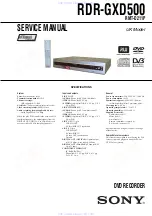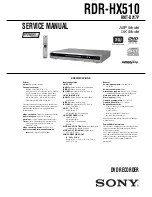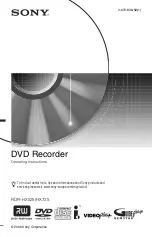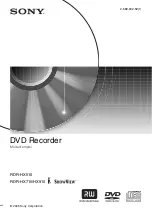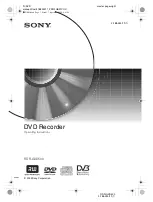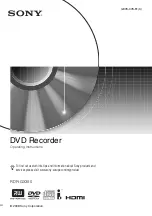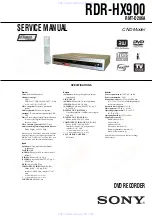
Table 1-4-2 Defective analyzing table
Case
1
2
3
4
5
6
7
8
Presumed cause (Main cause)
<General>
(1) Mechanism stops due to mechanical phase
mismatching.
(2) Loading motor does not rotate.
(Part is defective. * Circuit is defective.)
(3) S reel does not wind the tape.
<General>
(1) Sbrake is not released. (ON)
(2) T brake is not released. (ON)
(3) Idler does not swing.
(4) Pinch does not press.
(5) Capstan motor does not rotate.
(Capstan motor is defective. * Circuit is defective.)
<In case of no mechanical problem>
(6) Cylinder is defective.
(* Circuit is defective.)
(1) Reel rotation detection is defective.
(Sensor is defective. * Circuit is defective.)
(2) Idler does not swing.
(3) Reel belt is removed.
(1) Idler does not swing.
(2) Pinch is not press-fit.
(3) Capstan motor does not rotate.
(Capstan motor is defective. * Circuit is defective.)
(1) S brake is not released. (ON)
(2) T brake is not actuated.
(3) Idler does not swing.
(4) Pinch does not press.
(5) Capstan motor does not rotate.
(Capstan motor is defective. * Circuit is defective.)
<General>
(1) When the F/L is mounted on the mechanical
deck, the position is not correct.
(2) Tape start sensor is defective.
(3) Cassette-in switch is defective.
(1) Capstan motor is defective.
(2) ACE head control output is defective.
(* Circuit is defective.)
(1) ACE head is defective.
(2) Tape transport adjustment is defective.
(3) Hi-Fi head (cylinder) is defective.
(* Circuit is defective.)
Check method
(1) Check the mode shift "Cas-
sette out
«
FF/REW position"
can be performed when turning
worm wheel.
(2) Check loading motor whether it
turns by the outer power
supply (12.5V) correctly.
(3) Refer to case 3 in this table.
Check mechanical position.
(5) Check capstan motor.
(6) Check cylinder assembly.
(1) Check sensor output.
(2) Check the mechanical position.
(3) Check the reel belt is removed
or not.
Check mechanical position for the
causes (1) – (2).
(1) Check capstan motor.
Check mechanical position for the
causes (1) – (4).
(1) Check capstan motor.
(1) Check mechanical position.
(2) Refer to item 1-4 Mechanism
Check Method.
(3) Check the switch.
(1) Check capstan motor.
(1) Check ACE head.
Check CTL output.
(1) Check ACE head.
Check CTL output.
(2) Perform tape transport
adjustment again after confirming
tape transport condition.
(3) Check cylinder. Check whether
B+14V is supplied.
Treatment :
If the mechanism is found out to be defective according to the procedures described above, perform the following treatment.
• Misassembling, mechanical phase mismatch ................................ Repair correctly.
• Parts defect, parts damage .............................................................. Replace parts.
If the mechanism is found out not to be defective according to the procedures above, check the circuit(s).
Defective phenomenon (Main items)
Power does not turn on. Loading
operation is defective.
Mode shift operation is defective.
Loading operation is not
performed.
Unloading operation is not
performed.
Playback operation is not
performed.
Playback operation is defective.
Playback picture does not appear.
Video recording can not be
performed.
Playback interruption.
Detective phenomenon during
playback.
Recording interruption.
FF operation is not performed.
FF operation is defective.
REW operation is not performed.
REW operation is defective.
Other: REV/FF operation is not
performed.
Other: REV/FF operation is
defective.
REVIEW is not performed.
Slot-in is not performed.
Cassette can not be inserted.
Capstan servo does not work.
Capstan servo is uneven.
Tape speed is fast.
Tape speed is slow.
Tape speed is uneven.
FG pulse is not output.
Audio output does not come out.
Audio output is small.
Audio output variation is large.
Audio output is uneven.
Audio distortion.
Audio noise.
Other: Audio is defective.
































